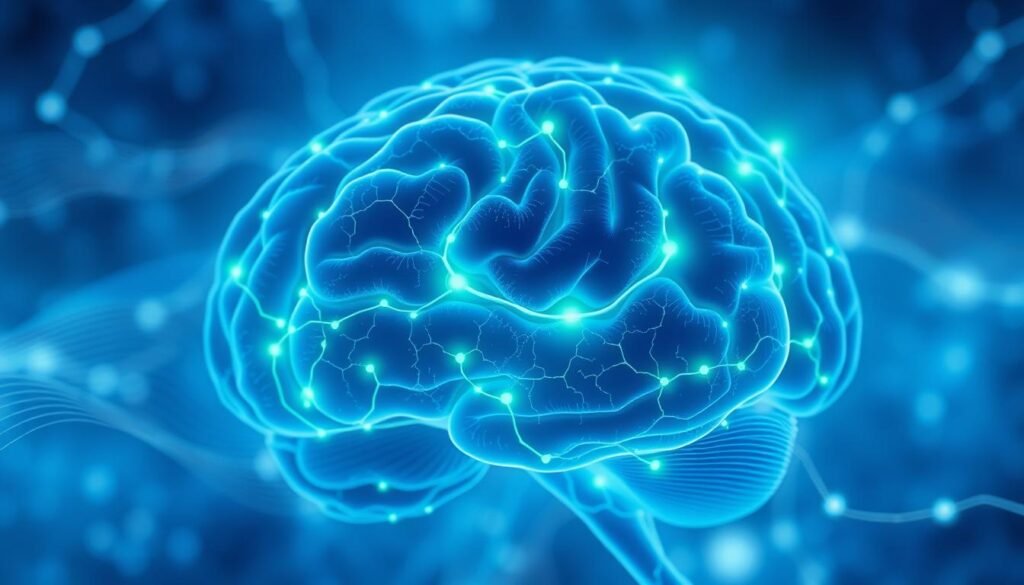Did you know about 31.1% of American adults will experience an anxiety disorder sometime? This important fact shows why we need effective ways to lessen anxiety symptoms. Gabapentin, usually known for stopping seizures, is now seen as a hopeful choice for those with anxiety disorders, like generalized anxiety disorder (GAD). This piece will fully cover how gabapentin helps with anxiety. It talks about how well it works, how it does its job, and its potential as a gabapentin alternative to benzodiazepines.
Key Takeaways
- Gabapentin is often prescribed off-label for anxiety disorders.
- It can be effective in reducing symptoms of generalized anxiety disorder.
- Common side effects may include dizziness and sleepiness.
- Unlike benzodiazepines, gabapentin has a lower risk of dependence.
- This treatment is effective for many individuals who haven’t found success with traditional medications.
- The typical starting dosage for anxiety often begins at 300 mg.
Introduction to Gabapentin and Anxiety
Gabapentin, first made to treat seizures and nerve pain, now also explores gabapentin for anxiety. This new use interests many since anxiety troubles about 40 million U.S. adults. It offers hope to those looking for different treatments.
Studies highlight gabapentin’s impact on easing anxiety. One study showed less anxiety in 420 women after cancer, in just eight weeks. Another found it helped with social fears within 14 weeks. This shows gabapentin as a promising option for anxiety issues.
About 3.1% of Americans face generalized anxiety disorder (GAD), with more women affected. It’s critical to tackle this, as anxiety is a top cause of disability in the wealthy nations. Gabapentin is now being looked at for hard-to-treat cases and easing anxiety before surgery.
Research on gabapentin for anxiety is encouraging. It helps doctors and patients find effective treatments. It sheds light on how gabapentin could work for anxiety in the future.
| Study | Findings |
|---|---|
| Breast Cancer Survivors | Reduction in anxiety symptoms following gabapentin treatment over eight weeks. |
| Social Phobia | Effective in reducing symptoms after a 14-week course of treatment. |
| Panic Disorder | Gabapentin demonstrated superiority over placebo in severely ill patients. |
| Generalized Anxiety Disorder | Positive results reported in treatment-resistant cases. |
| Preoperative Anxiety | Evidence suggests gabapentin may help reduce anxiety before surgery. |
What is Gabapentin?
Gabapentin is a drug doctors often prescribe as a nerve pain medication and anticonvulsant. This medicine helps calm the brain’s electrical activity. It helps with seizures and nerve pain from shingles. Its use in treating anxiety is still being explored. A gabapentin overview shows how it may be helpful beyond its main uses.
Overview of Gabapentin
Gabapentin is known by several brand names like Neurontin, Horizant, and Gralise. It’s mainly prescribed for Postherpetic Neuralgia, Epilepsy, and Restless Leg Syndrome. Even though it’s not approved by the FDA for anxiety, many use it off-label. Studies indicate it might ease symptoms of anxiety disorders like social anxiety and specific phobias.
FDA-approved Uses of Gabapentin
The FDA has approved gabapentin for nerve pain and seizure management. Its success in these areas has led doctors to consider it for anxiety. Some research suggests it can lessen panic disorder and generalized anxiety disorder symptoms. This shows gabapentin’s wide range of use, including for anxiety and chronic pain.

Gabapentin Uses for Anxiety: An Overview
Gabapentin is getting noticed for its possible anti-anxiety effects. This is true for those with anxiety disorders. Though the proof is not strong, many say it helps them feel better. People with generalized anxiety disorder, in particular, might find their symptoms ease. This can make life more enjoyable.
Research into how well gabapentin works has shown mixed results. Some studies looked at its use for anxiety linked to other mental issues. For example, testing on panic disorder patients showed using 600 to 3,600 mg/day of gabapentin wasn’t more effective than a fake drug. This was also seen in research on social phobia. This suggests gabapentin’s benefit for anxiety disorders might not work for everyone.
Still, gabapentin is being considered by doctors for treating anxiety. Some patients report feeling less anxious and more at ease socially after treatment. Its low addiction risk is also a major benefit. This makes it different from usual anxiety meds.

Gabapentin’s role in treating anxiety is still being studied. More research and people’s stories will help us understand its effectiveness better. Knowing its uses and limits is crucial as its use grows in treating anxiety.
How Does Gabapentin Work for Anxiety?
Understanding gabapentin’s role in anxiety treatment shines a light on its brain effects. It influences neurotransmitters, especially gamma-aminobutyric acid (GABA). GABA is known for making people feel calm. People having trouble with standard anxiety treatments might try gabapentin.
Mechanism of Action
The gabapentin mechanism of action adjusts how neurons react and boosts GABA in the brain. This makes it act like GABA, reducing nerve activity. Thus, it makes people feel more peaceful, offering an option for managing anxiety.
Impact on Neurotransmitters
Gabapentin significantly changes brain chemicals, decreasing anxiety symptoms. Its effects are crucial for those with panic and social anxiety. It’s shown promise for people who don’t find relief from common antidepressants, offering a new hope in anxiety treatment.

| Aspect | Details |
|---|---|
| Onset of Action | 2-8 hours |
| Full Effect Timeline | 1 week to 1 month |
| Common Dosage Range | 300 mg to 3600 mg per day |
| Potential Side Effects | Dizziness, drowsiness, nausea |
| Serious Risks | Thoughts of self-harm, allergic reactions |
For more about anxiety medications, see this resource or here for a complete guide.
Gabapentin Off-Label Anxiety Treatment
Off-label use means doctors prescribe medicines for reasons not officially approved by agencies like the FDA. This includes gabapentin off-label use for anxiety disorders. Originally for epilepsy and nerve pain, gabapentin helps calm anxiety, driving interest in its use beyond approved uses. Many seeking anxiety relief consider gabapentin a good alternative.
Definition of Off-Label Use
Doctors often prescribe medicines off-label, believing they help conditions not listed on the drug label. For example, prescribing gabapentin for anxiety shows this reliance. It’s vital when standard treatments fail or have addiction risks.
Reasons for Off-Label Prescription
Doctors may choose off-label anxiety treatments like gabapentin for several reasons. These include poor response to usual anxiety meds and concerns over the side effects of approved drugs. Research hinting at gabapentin’s effectiveness in treating anxiety and avoiding dependency issues with benzodiazepines are also influential.
Gabapentin is becoming a popular choice for anxiety relief. Its off-label use may bring benefits, especially when combined with other treatments. Understanding its potential in managing anxiety can facilitate better conversations between patients and healthcare providers.
Gabapentin for Generalized Anxiety Disorder
Managing generalized anxiety disorder (GAD) can be hard for many people. Gabapentin has become a potential treatment for those facing GAD. This medication helps with many symptoms of the disorder.
Symptoms of Generalized Anxiety Disorder that May Improve
People with GAD often feel excessive worry, get irritable, have trouble sleeping, and find it hard to focus. Gabapentin has been promising in easing these issues. It leads to significant improvement in GAD symptoms. Some patients report great relief from anxiety when they take the right doses.
Case Studies and Evidence of Effectiveness
A case study on Gabapentin showed its impact on anxiety. It focused on a patient with a lot of previous treatment trials but still severe anxiety. On a daily dose of 900 mg or more, the patient saw great anxiety reduction. But, doses under 600 mg did not help much.
While treating this patient, the use of tools like the Generalized Anxiety Disorder 7-item (GAD-7) questionnaire was important. It showed how adjusting the Gabapentin dose changed anxiety levels. When the dose went up, anxiety symptoms got better. This highlights Gabapentin as a good option for those with GAD.
Gabapentin Dosage for Anxiety
Healthcare providers often start with a careful plan when using gabapentin for anxiety. They begin with the initial dose and adjust it based on the patient’s reaction. This approach makes sure the treatment works well.
Starting Dosage Recommendations
The journey with gabapentin usually kicks off with a small dose of 300 mg, taken three times daily. This helps the body get used to the drug while keeping side effects low. The usual effective dose for easing anxiety is between 600 mg and 900 mg every day.
Adjustments might be needed, though. These depend on the patient’s age, weight, and health condition.
Titrating the Dose Based on Response
Doctors often adjust the amount of gabapentin a patient takes. This adjustment is based on the patient’s feedback. It usually takes about a month for the medication to work best. Sometimes, improvements keep coming until the eighth week.
Changes in dose depend on how well the patient is doing and the effects seen. Patients should always tell their doctors how they feel. This way, they can get the most benefit from the treatment.
| Dosing Phase | Dosage Range | Comments |
|---|---|---|
| Starting Dosage | 300 mg three times daily | Initial dose to minimize side effects. |
| Effective Range | 600 mg to 900 mg daily | Many patients find relief within this range. |
| Maximum Dosage | Up to 3,600 mg daily | Higher doses are typically divided throughout the day. |
Potential Side Effects of Gabapentin on Anxiety
When thinking about gabapentin for anxiety, it’s key to know its side effects. These effects range from mild to severe. Knowing about them helps you decide and be ready for any unwanted reactions. It’s vital to talk openly with your doctor about managing side effects.
Common Side Effects
Gabapentin can cause dizziness, sleepiness, nausea, and weight gain. You might also get a dry mouth, constipation, or have trouble talking. These side effects are usually mild but knowing about them is important for a safe treatment journey.
Serious Side Effects to Watch For
Some severe reactions include breathing problems, mood swings, or suicidal thoughts. This is more so for those already dealing with mental health issues. It increases chances for anxiety, sadness, or annoyance. Talking with your doctor about symptom changes is crucial to handle these risks well.